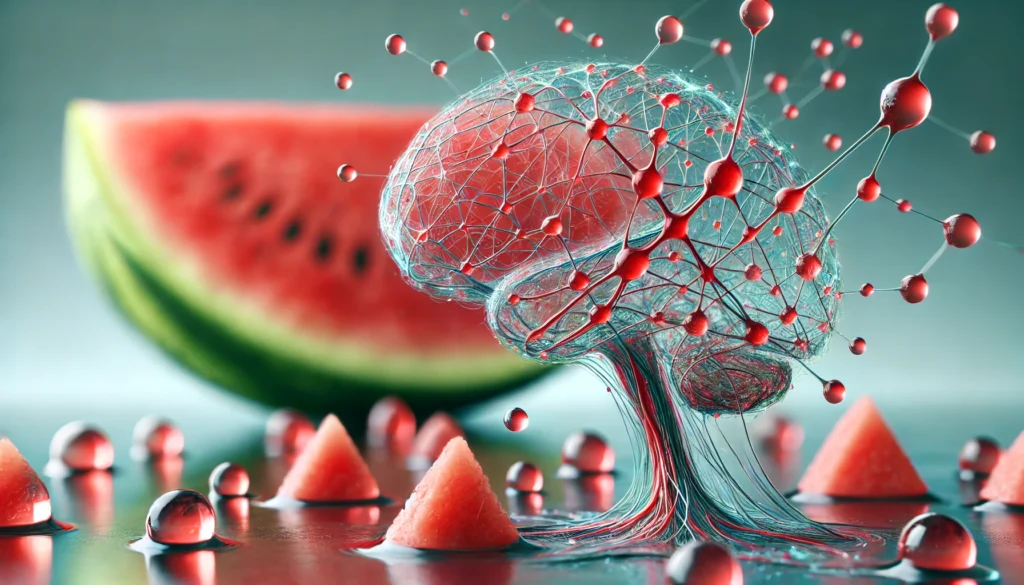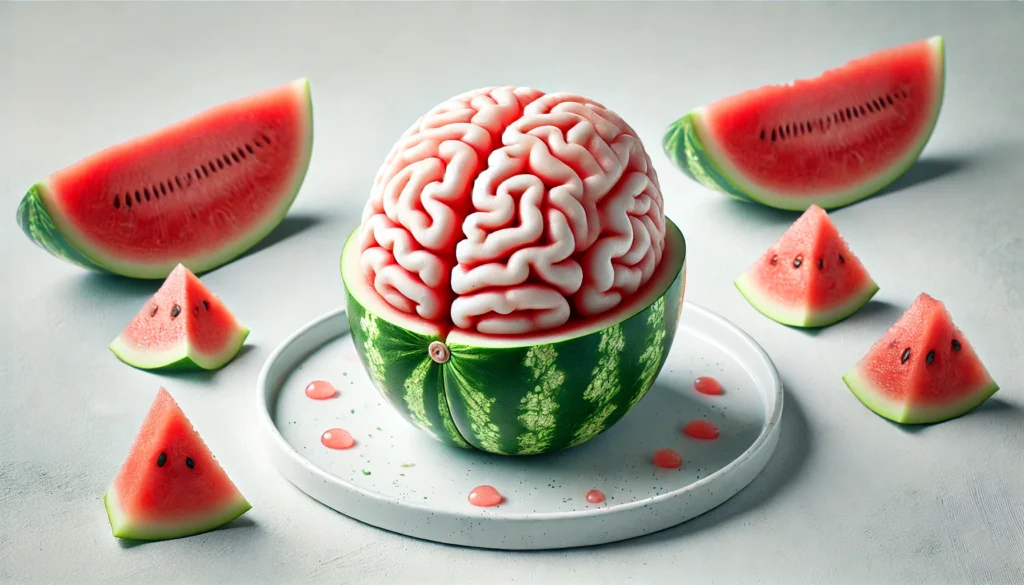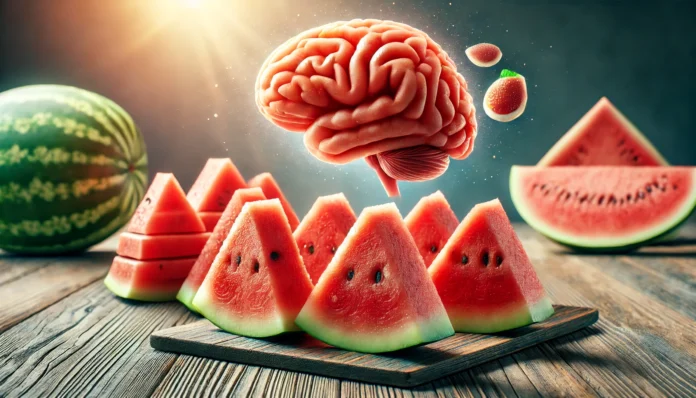As temperatures climb and summer approaches, few fruits capture the essence of refreshment quite like watermelon. Known for its high water content and naturally sweet flavor, watermelon is often celebrated for its hydrating properties. But beyond its reputation as a summer staple, this vibrant fruit has increasingly attracted the attention of researchers and health-conscious consumers alike for its potential cognitive benefits. The question arises: is watermelon good for your brain, or is this another health trend that fails to live up to the hype? To explore this fully, we must delve into the unique nutritional profile of watermelon, its impact on hydration and blood flow, its antioxidant richness, and how these factors may contribute to brain health.
You may also like: Best Brain Foods for Focus, Memory, and Longevity: What Science Says
Understanding Watermelon’s Nutritional Foundation
Watermelon is composed of about 92% water, making it one of the most hydrating fruits available. However, its value extends far beyond hydration. Rich in vitamins A, C, and B6, watermelon also contains essential amino acids such as citrulline, as well as antioxidants like lycopene and beta-carotene. Each of these components plays a distinct role in supporting overall health, including neurological function. Vitamin B6, for instance, is vital for neurotransmitter synthesis, influencing mood and cognition. Meanwhile, vitamin C serves as a powerful antioxidant, defending brain cells from oxidative damage that may accelerate cognitive decline.
Among the unique elements found in watermelon is the amino acid citrulline, which is converted in the body to arginine and then to nitric oxide. This compound helps dilate blood vessels, improving circulation throughout the body, including the brain. Enhanced blood flow to the brain is crucial for delivering oxygen and nutrients essential for optimal cognitive function. In essence, the nutritional makeup of watermelon provides several foundational components necessary for maintaining brain health, making it more than just a thirst-quenching treat.
The Brain-Hydration Connection
The brain is incredibly sensitive to fluctuations in hydration status. Even mild dehydration can lead to cognitive impairments, including difficulty concentrating, memory lapses, and reduced alertness. Since the human brain is composed of approximately 75% water, its functionality is closely tied to hydration levels. When dehydrated, the brain must work harder to perform basic tasks, which can impair executive function and mood.
Watermelon, with its high water content, offers a delicious and efficient means of rehydrating the body and brain. Unlike sugary sports drinks or caffeinated beverages that may lead to further dehydration, watermelon replenishes fluids naturally while providing additional nutrients that enhance cognitive performance. Studies have shown that consuming water-rich foods can be just as effective, if not more so, than drinking water alone when it comes to maintaining hydration levels.
Furthermore, watermelon’s blend of hydration and micronutrients creates a synergistic effect, promoting mental clarity and emotional stability. For those asking, “What does watermelon do to your brain?” one of the clearest answers is that it supports the brain’s hydration-dependent functions, thereby improving attention, mood, and processing speed. Whether consumed in slices or as part of a smoothie, watermelon acts as a functional food for mental performance, especially during hot weather or after exercise.
Nitric Oxide, Citrulline, and Brain Circulation
At the molecular level, few compounds are as critical to cerebral blood flow as nitric oxide. This gas molecule plays a pivotal role in vasodilation, the process by which blood vessels widen to increase blood flow. Adequate blood circulation ensures that brain cells receive the oxygen and glucose they need to function efficiently. Inadequate blood flow, conversely, has been linked to a range of cognitive problems, from brain fog to dementia.
Watermelon is one of the richest natural sources of citrulline, an amino acid that the body converts into arginine, which in turn facilitates nitric oxide production. This biochemical pathway has wide-reaching implications for brain health. Increased nitric oxide levels lead to improved endothelial function—the health of the cells lining blood vessels—which is vital for preventing age-related cognitive decline. As individuals age, the body’s ability to produce nitric oxide naturally diminishes, making dietary sources like watermelon increasingly important.
Emerging research suggests that improved blood flow resulting from higher nitric oxide levels may enhance neuroplasticity—the brain’s ability to reorganize itself by forming new neural connections. Enhanced neuroplasticity is linked to improved learning, memory retention, and resilience against neurological disorders. Thus, watermelon does more than hydrate; it actively contributes to the structural and functional optimization of the brain through its influence on circulation and nitric oxide synthesis.

Antioxidants in Watermelon and Neuroprotection
Free radicals are unstable molecules that can damage cells, including neurons, through oxidative stress. Over time, oxidative stress contributes to the aging of brain tissue and the development of neurodegenerative diseases such as Alzheimer’s and Parkinson’s. Antioxidants are the body’s primary defense against oxidative damage, neutralizing free radicals before they can inflict harm.
Watermelon is particularly rich in lycopene, a carotenoid with potent antioxidant properties. Lycopene has been shown to cross the blood-brain barrier, enabling it to exert protective effects directly within the brain. It scavenges harmful free radicals and reduces markers of inflammation, thereby preserving cognitive function. In fact, epidemiological studies have found that higher lycopene intake is associated with better cognitive performance in older adults.
In addition to lycopene, watermelon contains beta-carotene and vitamin C, both of which contribute to its neuroprotective profile. Beta-carotene is converted into vitamin A in the body, a nutrient essential for vision and neurological health. Vitamin C, on the other hand, supports the synthesis of neurotransmitters and protects neurons from oxidative insults. Together, these antioxidants form a powerful triad that helps to mitigate the effects of aging on the brain.
Those still wondering, “Is watermelon good for your brain?” should consider the mounting evidence that its antioxidant content plays a significant role in maintaining cognitive vitality. Regular consumption of watermelon can offer a dietary strategy for reducing the cumulative oxidative stress that impairs brain function over time.
Watermelon and Mood Regulation
Cognitive health is closely linked to emotional well-being. Conditions such as anxiety and depression often impair cognitive performance, and conversely, cognitive decline can lead to mood disturbances. This bidirectional relationship underscores the importance of addressing mental and emotional health through diet. Watermelon’s nutritional profile supports neurotransmitter balance and emotional regulation in multiple ways.
One key player is vitamin B6, which helps the body produce serotonin and dopamine—neurotransmitters associated with mood stabilization and reward processing. Adequate levels of these chemicals are essential for maintaining a positive outlook and emotional resilience. Watermelon’s vitamin C content also supports adrenal function, helping the body manage stress more effectively.
Additionally, the natural sugars in watermelon can provide a gentle lift in energy without the sharp spikes and crashes associated with refined sugars. This helps maintain a more stable mood throughout the day. Combined with its hydrating properties and micronutrient support, watermelon offers a mood-boosting effect that goes beyond simple pleasure from its taste.
Improved mood is not only valuable in its own right but also supports cognitive function. A calm, focused mind is more capable of learning, retaining information, and making decisions. As such, watermelon can be seen as a food that nourishes both the brain and the spirit, aligning with holistic approaches to mental wellness.
Blood Sugar Balance and Cognitive Clarity
A common concern about watermelon is its glycemic index, which measures how quickly a food raises blood sugar levels. While watermelon does contain natural sugars, its glycemic load—the measure of how much a food actually affects blood sugar—is relatively low due to its high water and fiber content. This makes watermelon a safe choice for most individuals when consumed in moderation.
Stable blood sugar levels are crucial for cognitive performance. Fluctuations in glucose availability can lead to symptoms such as brain fog, irritability, and impaired decision-making. The brain depends on a steady supply of glucose, and foods that cause spikes and crashes can disrupt this delicate balance. Watermelon provides a gentle, sustained release of energy that supports mental clarity and focus.
Moreover, the amino acids and vitamins in watermelon further enhance its brain-supportive effects, mitigating any potential downsides from its sugar content. Citrulline, for instance, supports insulin sensitivity and vascular health, both of which are critical for preventing the long-term cognitive effects of metabolic syndrome and type 2 diabetes. Thus, watermelon contributes to cognitive health not only by what it contains but also by what it helps prevent.
In summary, when asking, “What does watermelon do to your brain?” one must consider its ability to support blood sugar stability, which in turn fosters better concentration, memory, and mental endurance. Watermelon is far from a simple sugary treat; it is a complex, functional food that harmonizes energy delivery with nutrient density.
Watermelon in the Context of a Brain-Healthy Diet
A brain-healthy diet emphasizes foods rich in antioxidants, essential fatty acids, vitamins, minerals, and phytochemicals that support neurological function. While fatty fish, leafy greens, berries, and nuts often headline such lists, watermelon deserves a seat at the table for its multifaceted benefits. It complements other brain-boosting foods by adding hydration, circulatory support, and a unique antioxidant profile.
In practical terms, incorporating watermelon into meals can enhance the overall nutritional value of the diet. Paired with a handful of walnuts or a salad rich in leafy greens, watermelon can round out a meal that targets multiple aspects of brain health. Its versatility also allows for creative culinary applications, from smoothies and chilled soups to salsas and fruit salads, making it easy to consume regularly.
For those pursuing anti-aging strategies, watermelon offers a refreshing ally. Its combination of hydration, antioxidants, and nitric oxide precursors makes it particularly suited to combat the cognitive effects of aging. As oxidative stress and vascular decline contribute to age-related memory loss, watermelon serves as a natural buffer, helping to preserve mental acuity into later years.
Importantly, watermelon is accessible and affordable, making it a democratic superfruit that can be enjoyed across diverse populations. Its availability during the warmer months aligns perfectly with periods of increased dehydration risk, offering a timely intervention for both brain and body. By viewing watermelon through the lens of functional nutrition, it becomes clear that its benefits are not incidental but integral to cognitive wellness.
Scientific Research Supporting Watermelon’s Cognitive Benefits
The exploration of watermelon’s cognitive benefits is not merely anecdotal; it is increasingly supported by scientific inquiry. Studies examining the effects of citrulline supplementation have found improvements in endothelial function, reduced blood pressure, and enhanced exercise performance—factors that indirectly influence brain health through improved circulation and reduced inflammation. Animal studies have shown that citrulline can cross the blood-brain barrier and may enhance memory formation and synaptic plasticity.
Lycopene, another key component of watermelon, has been the subject of numerous studies related to cognitive aging. Research published in the journal Neurology has linked higher plasma lycopene levels with reduced risk of Alzheimer’s disease and better executive function in older adults. The ability of lycopene to reduce neuroinflammation and protect neuronal integrity positions it as a key player in cognitive longevity.
Moreover, watermelon’s rich vitamin C content aligns with findings that this antioxidant vitamin may slow cognitive decline. Longitudinal studies have found that individuals with higher vitamin C intake demonstrate better cognitive performance and a slower rate of memory loss over time. These findings underscore the importance of regular intake of vitamin-rich fruits such as watermelon.
While direct human studies on watermelon and cognitive performance remain limited, the collective evidence from related compounds—citrulline, lycopene, and vitamin C—strongly suggests a neuroprotective effect. As research continues, it is likely that watermelon will emerge not only as a functional food but as a legitimate dietary intervention for promoting brain health.

Frequently Asked Questions: The Cognitive Benefits of Watermelon
1. Can eating watermelon support brain health during intense mental work or study?
Yes, watermelon can be an excellent brain-friendly snack during periods of sustained cognitive effort, such as studying for exams or tackling demanding mental projects. Its high water content supports hydration, which is essential for maintaining concentration and reducing fatigue. But what does watermelon do to your brain beyond hydration? It provides a gentle dose of natural sugars and vitamin B6, which together can help support neurotransmitter synthesis and keep mental energy stable without causing sharp glucose spikes. Regular consumption during mentally demanding periods may help preserve cognitive stamina and improve mental clarity in a way that sugary snacks or energy drinks cannot. This makes watermelon a practical tool for students, professionals, and anyone seeking a cognitive edge.
2. Is watermelon good for your brain as part of a recovery routine after sleep deprivation?
After sleep deprivation, the brain is especially vulnerable to oxidative stress, inflammation, and poor circulation. Rehydration and replenishment of essential nutrients become critical. Watermelon offers a gentle re-entry point for recovery due to its hydration factor and its unique nutritional makeup. So, is watermelon good for your brain in these conditions? Absolutely—it provides antioxidant support from lycopene and beta-carotene while enhancing blood flow through citrulline-driven nitric oxide production, which may help restore alertness and improve short-term cognitive performance. Including it in a light morning meal post-sleep-deprivation can aid in mood stabilization and cognitive recalibration.
3. Does watermelon support cognitive longevity in older adults?
Emerging nutritional science suggests that dietary choices in midlife and later years significantly influence long-term brain health. What does watermelon do to your brain in the context of aging? Its antioxidants, particularly lycopene, can help mitigate age-related oxidative damage to neural tissues. Additionally, the vasodilatory effects of citrulline support healthy cerebral blood flow—an essential factor in maintaining memory, reasoning, and executive function in aging adults. While watermelon alone is not a magic bullet for dementia prevention, incorporating it into a diet rich in plant-based antioxidants, healthy fats, and polyphenols can create a supportive foundation for cognitive longevity. It’s an accessible and enjoyable addition to any brain-conscious lifestyle plan.
4. Can watermelon improve mental recovery after intense physical activity or heat exposure?
Physical exertion and heat exposure can temporarily impair mental clarity due to dehydration and reduced cerebral perfusion. In these cases, what does watermelon do to your brain? It acts as a recovery agent by replenishing fluids, restoring electrolyte balance, and stimulating blood circulation through nitric oxide pathways. These effects collectively help the brain recover from heat- or exercise-induced fatigue. The presence of potassium in watermelon also supports cellular hydration and nerve signal transmission, making it an ideal post-workout snack not just for muscle recovery, but for mental rejuvenation as well. Adding a watermelon smoothie with a pinch of sea salt can amplify both brain and body recovery.
5. Are there specific times of day when watermelon’s brain benefits are most effective?
Timing your intake of brain-boosting foods can amplify their benefits. For example, early morning and mid-afternoon are periods when energy and focus tend to dip for many people. Consuming watermelon during these windows can support hydration and improve alertness without the crash associated with caffeine or refined sugars. So, is watermelon good for your brain in terms of cognitive rhythm? Yes, it fits well within a circadian-aligned nutrition strategy. By offering hydration, glucose, and micronutrient support at strategic moments, watermelon may help regulate mood and attention more effectively than many conventional snacks.
6. How does watermelon compare to other fruits in terms of brain health support?
While fruits like blueberries and avocados receive substantial attention for cognitive benefits, watermelon brings a unique combination to the table. What does watermelon do to your brain that distinguishes it? Its high citrulline content enhances blood flow more directly than most fruits, and its water content makes it superior for supporting hydration-sensitive cognitive functions. Compared to denser fruits, watermelon is lighter and easier to digest, which can be beneficial when mental clarity is needed without digestive sluggishness. It also contains minimal fat, making it an excellent complement to brain-healthy fats like walnuts or flaxseeds in a balanced meal. While not a substitute for other brain-focused super fruits, watermelon plays a distinctive and supportive role in the neurological diet.
7. Can watermelon play a role in mental wellness strategies for managing anxiety or stress?
Chronic stress and anxiety can impair memory, concentration, and even alter brain structure over time. Is watermelon good for your brain under emotional stress? It offers mild, natural mood support through its vitamin B6 content, which aids in serotonin and dopamine production. Additionally, its cooling, hydrating properties create a soothing sensory experience that can contribute to relaxation and emotional grounding. The act of eating watermelon—slowly savoring its refreshing taste—can serve as a mindful eating practice, promoting parasympathetic nervous system activation. While it is not a substitute for medical or psychological intervention, watermelon can be part of a larger emotional wellness toolkit that includes nutrition, mindfulness, and self-care.
8. How does watermelon consumption affect mental performance in hot climates?
Environmental heat is a well-documented stressor on cognitive performance, reducing concentration, working memory, and executive function. In these conditions, what does watermelon do to your brain that other snacks might not? Its high water content and electrolyte profile help cool the body and maintain fluid balance, reducing the physiological stress placed on the brain. Additionally, the amino acid citrulline enhances blood vessel dilation, supporting better thermoregulation and cerebral blood flow. In hot climates, regular watermelon consumption may be particularly beneficial for outdoor workers, athletes, and students, helping them maintain mental function in physically taxing environments. Pairing watermelon with light proteins like yogurt can further enhance its cognitive benefits.
9. Can watermelon consumption be part of a neuroprotective strategy for individuals with a family history of cognitive disorders?
For those with a genetic predisposition to Alzheimer’s disease or other forms of dementia, dietary interventions may offer a proactive defense. So, is watermelon good for your brain in a neuroprotective context? Its lycopene content shows promise in reducing amyloid plaque accumulation, a key factor in Alzheimer’s pathology. Additionally, regular intake of vascular-supportive foods like watermelon may help counteract the microvascular damage often seen in cognitive decline. It’s important to emphasize that watermelon should be part of a broader lifestyle approach that includes exercise, sleep, cognitive engagement, and a plant-rich diet. However, its low-calorie profile and nutrient density make it a convenient, sustainable addition to long-term brain health planning.
10. Are there innovative ways to include watermelon in a brain-enhancing diet beyond simply eating it fresh?
Absolutely. Creative culinary applications can enhance both the enjoyment and efficacy of watermelon in cognitive nutrition. What does watermelon do to your brain when integrated into blended, fermented, or spiced preparations? Blending watermelon with beetroot can amplify nitric oxide production for enhanced cerebral blood flow, while adding mint and lime may support digestion and mood. Watermelon gazpacho or cold-pressed juice with turmeric can add anti-inflammatory benefits, potentially enhancing its neuroprotective potential. Even freezing watermelon cubes for use in herbal teas can increase daily fluid intake while delivering subtle cognitive support. With a little imagination, watermelon can become a versatile brain-boosting ingredient in smoothies, salads, soups, and functional beverages.

Conclusion: Watermelon’s Cognitive Power is More Than Just Summer Hype
Watermelon is more than a refreshing summer indulgence. It is a brain-boosting powerhouse packed with hydration, antioxidants, and circulatory enhancers that work in concert to support cognitive performance, emotional well-being, and long-term neurological resilience. For those still asking, “Is watermelon good for your brain?” or “What does watermelon do to your brain?”—the answer lies in a growing body of evidence that highlights its multifaceted role in brain health.
From improving blood flow and supporting hydration to defending against oxidative stress and stabilizing blood sugar, watermelon offers a range of cognitive benefits that are both scientifically grounded and easily accessible. It aligns beautifully with dietary strategies focused on anti-aging and cognitive enhancement, making it a practical and enjoyable choice for individuals seeking to preserve and elevate mental function.
Incorporating watermelon into a balanced diet is a simple yet powerful step toward optimizing brain health. As the science continues to evolve, one thing is clear: the brain, like the body, thrives when nourished with nature’s most vibrant offerings. And watermelon, in all its juicy brilliance, is undoubtedly among them.
hydrating fruits for brain health, nitric oxide and cognition, fruits that improve memory, natural sources of lycopene, watermelon nutrition facts, amino acids and brain function, summer superfoods for mental clarity, antioxidant-rich fruits, brain fog remedies, citrulline benefits for brain, foods for better blood flow, brain-boosting snacks, fruits for cognitive longevity, mood-enhancing foods, neuroprotective fruit nutrients, hydrating foods for mental focus, watermelon and mental performance, cooling foods for brain health, brain-healthy summer foods, natural ways to support memory
Further Reading:
What are the health benefits of watermelon?
Is Watermelon Good for Brain Health? Exploring the Benefits of This Summer Delight
Mental health benefits of watermelon; ways the summer fruit can ease your anxiety
Disclaimer
The information contained in this article is provided for general informational purposes only and is not intended to serve as medical, legal, or professional advice. While Health11News strives to present accurate, up-to-date, and reliable content, no warranty or guarantee, expressed or implied, is made regarding the completeness, accuracy, or adequacy of the information provided. Readers are strongly advised to seek the guidance of a qualified healthcare provider or other relevant professionals before acting on any information contained in this article. Health11News, its authors, editors, and contributors expressly disclaim any liability for any damages, losses, or consequences arising directly or indirectly from the use, interpretation, or reliance on any information presented herein. The views and opinions expressed in this article are those of the author(s) and do not necessarily reflect the official policies or positions of Health11News.


